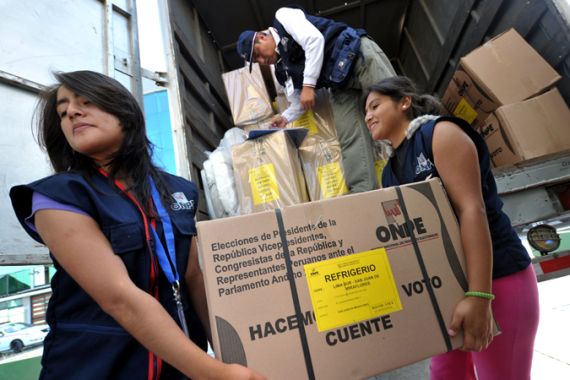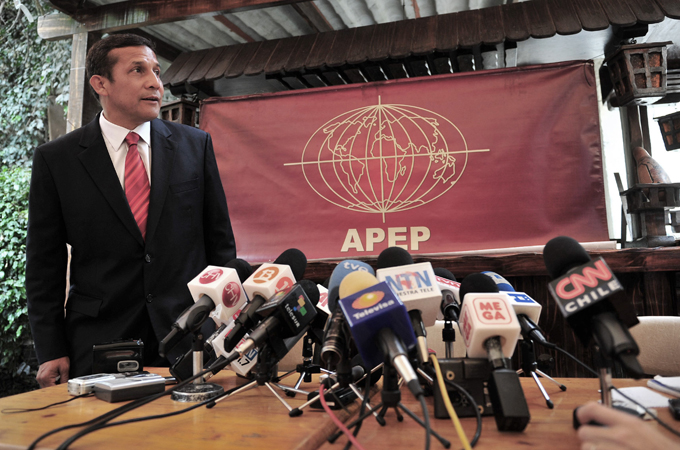Peru to vote for president in tight election
Four candidates are regarded as having good chances of making it to the June 5 runoff.

 |
| Humala, leader of the Peruvian Nationalist Party, led a brief rebellion against former president Alberto Fujimori [AFP] |
Some 20 million Peruvians are to head to the polls on Sunday for a tight presidential election, in which four candidates are regarded as having good chances of making it to the June 5 runoff.
Polls have showed that none of the 10 candidates were expected to reach the threshold of half the vote needed to avoid a runoff.
Former anti-government rebel Ollanta Humala maintains a slim lead over his closest rival, the daughter of a jailed ex-president, a poll showed on Saturday.
The Ipsos poll gave Humala, the leader of the Peruvian Nationalist Party, 28.1 per cent of the vote, followed by congresswoman Keiko Fujimori, the daughter of the former president, with 21.1 per cent, pointing to a close runoff between them.
Humala, a lieutenant colonel in the army, launched a small rebellion against Fujimori’s father, Alberto Fujimori, in 2000. Fujimori was removed from office that year and has been sentenced to 25 years in prison for his role in human rights violations perpetrated during the country’s battle against leftist guerillas in the 1990s.
The poll of 6,000 people, which was carried out on Saturday, gave former Prime Minister Pedro Pablo Kuczynski 19.9 per cent and former President Alejandro Toledo 16.8 per cent, a source with access to the survey told the Reuters news agency. The margin of error was not available. There are 10 candidates in all.
Fujimori, Kuczynski and Toledo are favoured over Humala by the business community in one of the world’s fastest-growing economies, although Humala has sought to portray himself as a moderate leftist who has moved on from his radical past.
Humala created his party in 2005 and ran for president the following year, losing to the man who currently occupies the office, Alan Garcia.
Garcia is prevented by law from runing again, but his ruling party, the American Popular Revolutionary Alliance (APRA), backed Kuczynski on Saturday, a step one pollster said could boost the former Wall Street banker’s chances of making it into the expected runoff.
A second round will be held on June 5 if no candidate gets more than 50 per cent of the vote.
Ruling support could boost Kuczynski
The APRA said Kuczynski had “democratic convictions” that would guarantee the continuation of current government policy.
“Our support is unconditional and we haven’t even spoken with (Kuczynski). We’ve done this with the country’s interests in mind,” Jorge del Castillo, an APRA figure, told Reuters.
Humala’s enjoys strong support among Peru’s low-income population, and Fujimori carries the legacy of her father’s corruption with her, but many still appreciate the former president for overseeing years of economic expansion and improved infrastructure.
Much of the campaign has focused on who can guarantee continued growth while also spreading the benefits to the one in three Peruvians who still lives in poverty.
Despite the strong economic growth seen during his presidency, Garcia has a disapproval rating of about 60 per cent, and his party is not running its own candidate.
Some political analysts say APRA’s support could help swing the tight race, though others point to its weakened influence in recent years.
“The backing of APRA could mean about 3 percentage points,” said Manuel Saavedra of the CPI pollsters. “APRA’s support is very important. It it wasn’t for that, it would look tricky for (Kuczynski) to get to the second round.”
Kuczynski, 72, known as “El Gringo” because of his European parents, is backed strongly by wealthy voters in the capital, Lima. But he could struggle to gain traction farther afield.
Most recent polls have shown him gaining ground. The previous Ipsos poll, published on Thursday, gave him 18.4 percent.
Humala has surged in the race by shedding his hard-line image and recasting himself as a soft leftist in the mold of Brazil’s popular former president, Luiz Inacio Lula da Silva.